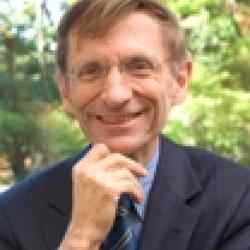
Bill
Bill Drayton is a social entrepreneur with a long record of founding organizations, bringing big change, and service. As a student, he founded organizations ranging from Yale Legislative Services to Harvard’s Ashoka Table, an inter-disciplinary weekly forum on how society truly works. After graduation from Harvard, he received an M.A. from Balliol College in Oxford University and his J.D. from Yale Law School. Over ten years at McKinsey & Company, he brought significant structural changes to policy and organizations. He also taught at Stanford Law School and Harvard’s Kennedy School of Government. He served in the Carter Administration White House and as Assistant Administrator at the Environmental Protection Agency, where he launched emissions trading and many other lasting reforms. He launched Ashoka in 1981. He used the stipend he received when elected a MacArthur Fellow in 1984 to devote himself fully to Ashoka. Bill is Ashoka’s Chair and Chief Executive Officer. He is also chair of three other organizations; Youth Venture, Community Greens, and Get America Working!
Bill has won numerous awards and honors throughout his career. He has honorary doctorates from Yale, NYU, and others; and he is a Fellow of Balliol College, Oxford. He is a member of the American Philosophical Society, the American Academy of Arts and Sciences, and the Council on Foreign Relations. He was selected one of America’s Best Leaders by US News & World Report and Harvard’s Center for Public Leadership. Other awards include the Yale Law School’s highest alumni honor, the National Wildlife Federation’s Conservation Achievement Award International; and the National Academy of Public Administration National Public Service Award.
Bill is an avid backpacker. He especially loves long, off trail, above the tree line immersions.
As Ashoka’s CEO, Bill brings history-based vision and a deep grasp of how things work to help Ashoka keep learning and keep changing big time so that it and its community can make the truly big contributions it can and must. He has overall management responsibility and, as one of three members of the Leadership Team, has special responsibilities for Purpose Teams (e.g. Young People, Climate), “Jujitsu” Partners and Metro Areas, Frame Change/Communications, organizational evolution, and Search/Talent.
(photo: (c) Yusuke Abe)
Bill Drayton: "Once a young person has had a dream, built a team, and changed their world… they will be a changemaker for life"

In elementary school I could not imagine why I was being tortured by Latin or Math, and my perception of soccer was chiefly that of being a crashee.
But I loved starting things, especially newspapers. Once I had saved enough to buy a mimeograph machine (the prior technology being typing hard with as many carbon copy sheets as possible), I was unstoppable.
The logic of producing what became a 32- and then 50-page newspaper with writers and circulation well beyond my school was also irresistible. I had to go out and get advertisements, and I had to organize peers in many places. All this was obvious to me, but it meant not always being where I was supposed to be.
Many years later when my mother died I found correspondence with the principal of my school. My mother was more than a little worried. (Why is my fifth grader neither in school or at home?) However, the principal patiently and ultimately successfully argued that everyone should trust me. In fact, he advised: “Don’t even show that you are anxious.”
Bless him!
Once a young person has had a dream, built a team, and changed his or her world, he or she has the power to express love and respect in action–the heart of what brings health, longevity, and happiness.
He or she will be a changemaker for life. Which is to say s/he will be a real contributor in a world where value increasingly comes from changemaking and not, as it has for millennia, from efficiency in repetition. It is no accident that over 80 percent of the 3,000 Ashoka leading social entrepreneurs (over half have changed national policy within five years of launch) Fellows started something in their teens, usually early teens.
I and Ashoka believe that the education reform discussion has long largely missed the boat. It is focused chiefly on access to schools driven by an outdated set of objectives, mastering a body of knowledge and a set of rules. That makes sense in a static world. But not in one defined by accelerating change.
Now we must ensure that all of this generation of young people are changemakers before they turn 21. That means that they must master the core changemaking skills–empathy/teamwork/new leadership/changemaking.
The only way they can is by practicing and practicing, by in fact being changemakers.
How many principals today know that they are on this very different playing field?
Once a young person has had a dream, built a team, and changed his or her world, he or she has the power to express love and respect in action – the heart of what brings health, longevity, and happiness. He or she will be a changemaker for life. . . a real contributor in a world where value increasingly comes from changemaking and not, as it has for millennia, from efficiency in repetition.
– Bill Drayton, Founder and CEO, Ashoka